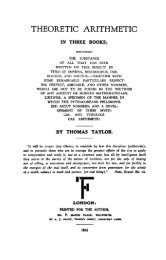The Mystical Hymns of Orpheus - Platonic Philosophy
The Mystical Hymns of Orpheus - Platonic Philosophy
The Mystical Hymns of Orpheus - Platonic Philosophy
Create successful ePaper yourself
Turn your PDF publications into a flip-book with our unique Google optimized e-Paper software.
178 ADDITIONAL NOTES,<br />
the second, which is alone moved, is Saturn ; and the third,<br />
which is both moved and permanent, is Heaven.<br />
Saturn, from his impartible, unical, paternal, and beneficent<br />
subsistence in the intellectual orders, has been considered<br />
by some as the same with the one cause <strong>of</strong> all<br />
things. He is, however, only analogous to this cause, just<br />
as <strong>Orpheus</strong> calls the first cause Time (~povos) nearly<br />
homonymously with Saturn (~povos). But the Oracles <strong>of</strong><br />
the Gods characterize this deity by the epithet <strong>of</strong> t7~e once<br />
(T~J aaat) ; calling him once beyond (aaaE ~rre~e~va). For<br />
the once is allied to the one.<br />
Heaven, the father <strong>of</strong> Saturn, is an intellect understanding<br />
himself indeed, but united to the first intelligibles ; in<br />
which he is also firmly established ; and connectedly contains<br />
all the intellectual orders, by abiding in intelligible<br />
union. This God too is connectire, just as Saturn is <strong>of</strong> a<br />
separating peculiarity ; and on this account he is father. For<br />
connecting precede separating causes ; and the intelligible<br />
and at the same time intellectual such as are intellectual<br />
only. Whence also Heaven being the Synocheys (avvo~evs)<br />
<strong>of</strong> wholes, according to one union gives subsistence to the<br />
Titannic series, and prior to this, to other orders <strong>of</strong> the<br />
Gods ; some <strong>of</strong> which abide only in him, which he retains<br />
in himself ; but others both abide and proceed, which he is<br />
said to have concealed after they were unfolded into lightr.<br />
And after all these, he gives subsistence to those divine<br />
orders which proceed into the universe, and are separated<br />
from their father. For he produces tw<strong>of</strong>old monads, and<br />
triads, a8nd hebdomads equal in number to the monads.<br />
<strong>The</strong>se things, however, will be investigated more fully<br />
elsewhere. But this deity is denominated according to the<br />
similitude <strong>of</strong> the apparent Heaven. For each <strong>of</strong> them compresses<br />
and connects all the multitude which it contains,<br />
and causes the sympathy and connection <strong>of</strong> the whole<br />
world to be one. For connection is second to unifying<br />
power, and proceeds from it. In the Phedrus, therefore,<br />
Plato delivers to us the production <strong>of</strong> all secondary natures<br />
by Heaven, and shows us how this divinity leads upwards

















